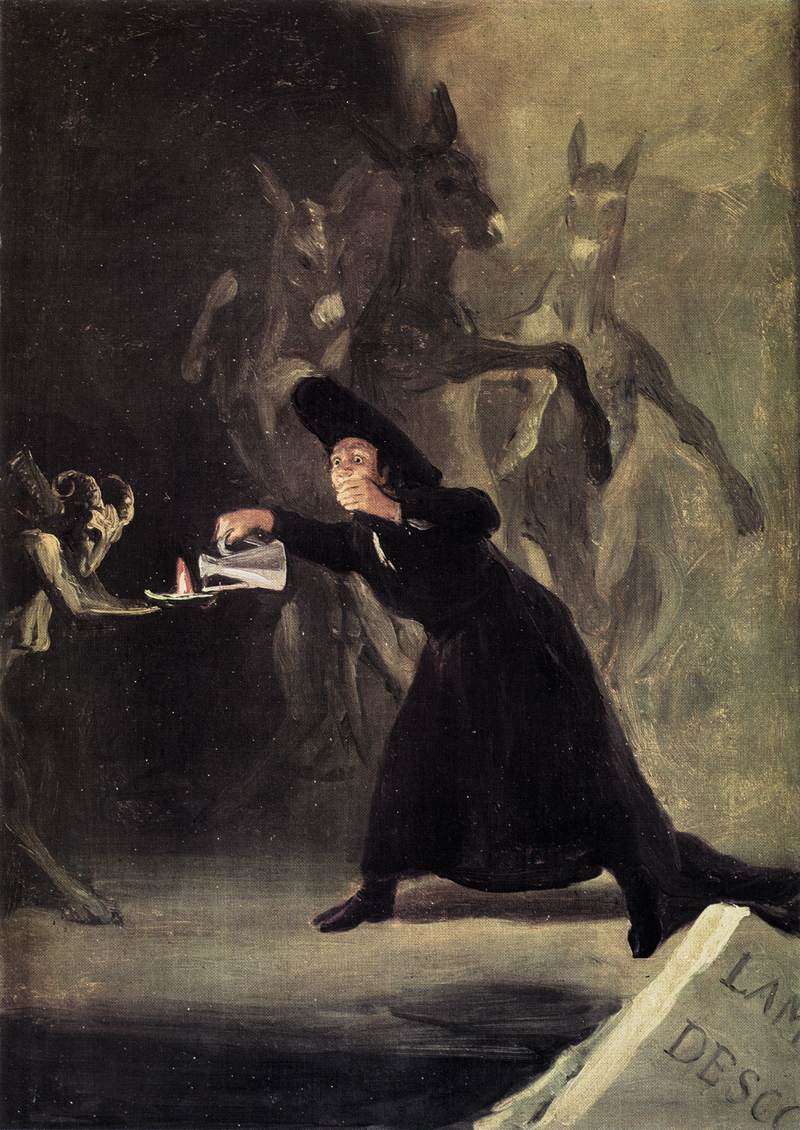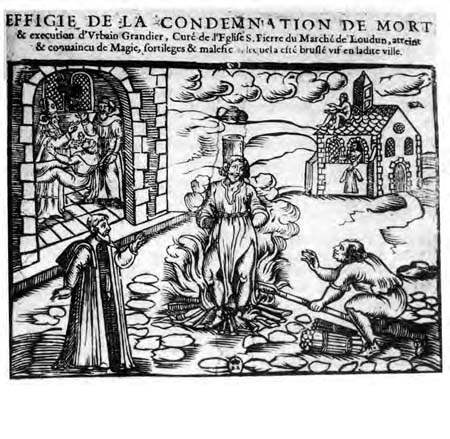by Robert Gear (February 2019)

The Bewitched Man, Francisco de Goya, 1798
In Aldous Huxley’s The Devils of Loudon, we are given an account of what used to happen when prosecutors and persecutors got out of hand. In an Ursuline convent in the town of Loudon in SW France in the early part of the 17th century, the nuns became possessed of devils and indulged in a variety of extraordinary behaviors that got the attention of the local enemies of Urbain Grandier, a priest. Exorcists were summoned to rid the nuns of their possession. Through skillful application, they managed to convince these frenzied people, and in particular the prioress, Sister Jeanne des Anges, to insinuate a range of damning accusations against Grandier. Finally, his enemies were able to pounce. Higher  authorities became involved, including Cardinal Richelieu himself. Grandier was imprisoned, tortured mercilessly and burnt at the stake. The priest’s final weeks are described with unsparing detail by Huxley.
authorities became involved, including Cardinal Richelieu himself. Grandier was imprisoned, tortured mercilessly and burnt at the stake. The priest’s final weeks are described with unsparing detail by Huxley.
What exactly were his crimes? Mostly they were of an amorous nature: seductions here and there and getting a bastard upon the daughter of the public prosecutor. He married, “in defiance of law and custom, of Church and state,” as Huxley puts it, an orphan left in his spiritual care. Beyond these sins, Grandier had excited envy and jealousy amongst the town’s notables. This eloquent priest was “in the prime of youth, tall, athletic, with an air of grave authority, even . . . of majesty.”
The prioress developed a hysterical infatuation for the priest, something which in her case, at least, he had done nothing to instigate. He had refrained from carnal entanglement with this woman since she was dwarfish and deformed and by all accounts a thoroughly unpleasant individual. With such qualities and concomitant resentments and, as Huxley contends, an understanding of the harm she initiated, it is not a stretch to envisage her brandishing virtue in a coven of fourth-wave feminists.
Read More in New English Review:
Preferring Failures
The Fascist Devil
Sura and Pumbedita
Political and religious animosities raging through France added weight to Grandier’s eventual downfall. To abbreviate the story somewhat, Sister Jeanne and some of the other sisters of the convent, by their demented manners and imaginings, brought down on their house authorities both religious and secular to exorcise the devils that had possessed them. Despite the incredulity of some skeptical visitors, Grandier was accused of bewitching the Ursulines, leading to his eventual unspeakable end at the hands of the French administrative state.
Such injustice leveled against what today would be considered minor offences were apparently relatively commonplace in pre-Enlightenment Europe. True, the witch-hunting craze seems to have dissipated somewhat by the end of the 1600s. Note, however, that the last known use of a ducking stool in England was in 1809 in Leominster. The apparatus employed is prominently displayed in Leominster Priory Church allowing curious visitors a casual moment to ponder the horrors of long-banished forms of justice.
Notwithstanding the reversion to barbarity of the Communist nouveau-monarchies and the continued barbarism of pre-Enlightenment regions of Africa and the Middle East, we don’t imagine such legally condoned punishments conceivable in our more Whiggishly entertained regions.
Despite the apocalyptic history of much of the last century, many in the West tend to picture themselves beyond such viciousness, somehow quarantined within a pacified present, Frankenstein’s nameless creature now shackled and dormant. We have many more humane and thoughtful approaches to those indulging in extraordinary mental aberrations. And we would never attempt, would we, to persecute anyone based merely on accusations made by those with proven mental irregularities. The hideous treatment of the priest, Grandier, and of countless others throughout those benighted centuries has been moderated.
But the immense past may reach out to touch our present in devastating ways. Huxley points out that
convinced materialists are ready to worship their own jerry-built creations as though they were the Absolute, and self-styled humanists will persecute their adversaries with all the zeal of Inquisitors exterminating the devotees of a personal and transcendent Satan.
Heinrich Kramer, the author (Jacob Springer’s name was added later) of Malleus Maleficarum, first published in Germany in 1487, is the textbook of all witch hunters. This work cites many authorities to prove that the proper penalty for witchcraft is death. The more modern analog is the position of Jews  under Hitler, of “fascists” under the Communist regimes and wherever socialist thought gains a foothold, and now of those who oppose climate jihadism or maintain a broadly conservative outlook against the antinomian tenets of modern leftists. These latter graspingly push into the lives of those who do not bend to their often tyrannical wishes.
under Hitler, of “fascists” under the Communist regimes and wherever socialist thought gains a foothold, and now of those who oppose climate jihadism or maintain a broadly conservative outlook against the antinomian tenets of modern leftists. These latter graspingly push into the lives of those who do not bend to their often tyrannical wishes.
To take just one very recent public display of how certain people find meaning in their lives, think how elements, or perhaps the whole “community,” of the trainspotterishly assiduous left tried to destroy (not just reject) a recent Supreme Court nominee. The media circus surrounding this particular event had all the features of a medieval witch hunt. As Kramer and Sprenger, (quoted by Huxley) argue, “The laws allow that any witness whatever is to be admitted in evidence against them.” We shudder to recall from this television and internet spectacle the persecutors and their media and academic cronies with their faces lecherously cosseting the sense of their own virtue.
And the modern inquisition piled on gleefully. Assistant Professor C. Christine Fair, from Georgetown University, has twittered out a recommendation (or is it a demand?) for the mass culling and castration of white males. This appears to be because some people had the temerity to support the aforementioned nominee. Here is her twitter tirade:
Look at the course of entitled white men justifying a serial rapist’s arrogated entitlement. All of them deserve miserable deaths while feminists laugh as they take their last gasps . . . Bonus: we castrate their corpses and feed them to swine? Yes.
The website of the venerable institution which employs this individual includes a long list of boasts about her accomplishments. Amazingly, one of the boasts is that “she is a senior research associate at USIP’s Center for Conflict Analysis and Prevention. She has served as a Senior Fellow at West Point’s Combating Terrorism Center.”
Yes, you read that right.
Read More in New English Review:
Apeshit at the Louvre
The Fascist Devil
When the Woke Reawaken
According to the Malleus, all kinds of evidence could be admitted in uprooting devil worship including gossip, hearsay, statements made by demoniacs and even recollected dreams. Most of these forms of “evidence” were used against the President’s nominee. The main “witness for the prosecution,” a psychologist living partially off government subventions and, we hear, teaching at a Californian seat of higher learning, appeared mostly to be recollecting dreams from nearly four decades previously. This woman played the part, for such it was, of Sister Jeanne to a T.
In fact, most of her accusations appear to have been dreamt up or wholly concocted, as though the Malleus Maleficarum has been reissued as a How-To-Guide for overzealous witch finders. This incunabulum, then, may soon join the august club of How-To-Guides excavated by the radical left for inspiration, along with such celebrated favorites as 1984 and Brave New World. Further down the road, we may anticipate demands for facial equality of outcome to add to the absurd calls for racial equality of outcome. So L.P. Hartley’s 1960 dystopia Facial Justice could be another source of really cool ideas. A new slogan for the demented could be, “Not just Racial, but Facial!”
Some of the accusers of the Supreme Court nominee were ignored even by the purveyors of American Pravda since the minds that concocted the accusations appeared almost emptier than the toilet-paper dispensers on the Hoboken to Trenton Amtrak line.
In the Loudon of the 1630s, the hysterical behavior of the prioress was infectious, and soon the whole convent was throwing fits, blaspheming, and talking obscenities. In the United States of the early twenty-first century, the behavior of some of the cross-examining Senate members was also infectious, and soon the whole legacy media and their devoted public was digging up concocted dirt, recollecting dreams, and generally talking stuff-and-nonsense while cleaving fanatically to their ideological paths.
____________________
Robert Gear is a Contributing Editor to New English Review who now lives in the American Southwest. He is a retired English teacher and has co-authored with his wife several texts in the field of ESL.
Follow NER on Twitter @NERIconoclast
- Like
- Digg
- Tumblr
- VKontakte
- Buffer
- Love This
- Odnoklassniki
- Meneame
- Blogger
- Amazon
- Yahoo Mail
- Gmail
- AOL
- Newsvine
- HackerNews
- Evernote
- MySpace
- Mail.ru
- Viadeo
- Line
- Comments
- SMS
- Viber
- Telegram
- Subscribe
- Skype
- Facebook Messenger
- Kakao
- LiveJournal
- Yammer
- Edgar
- Fintel
- Mix
- Instapaper
- Copy Link







